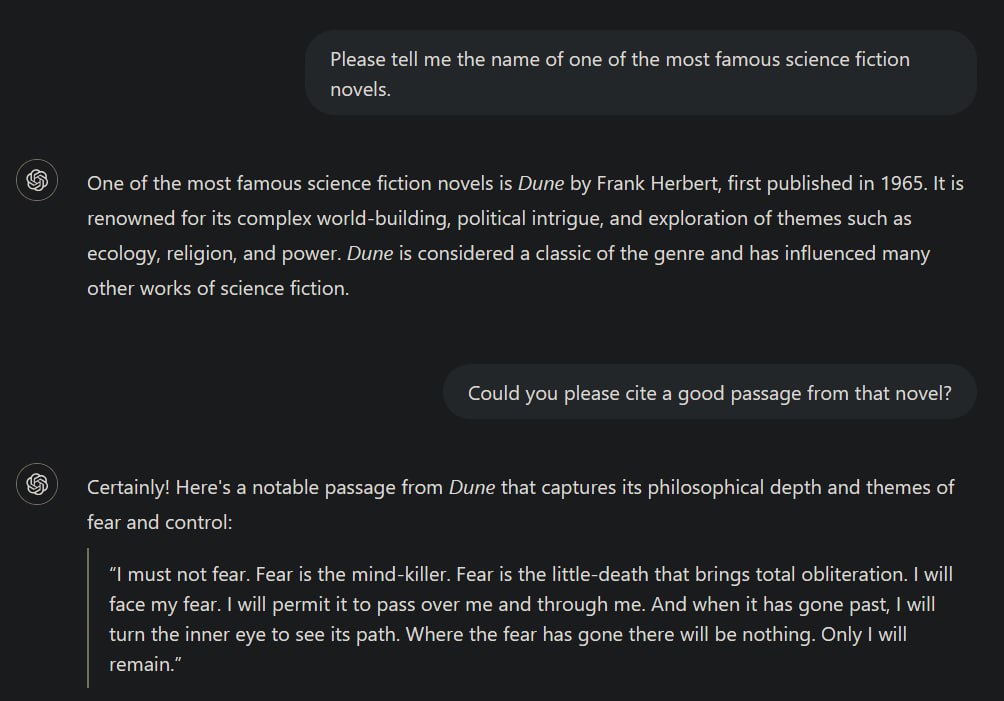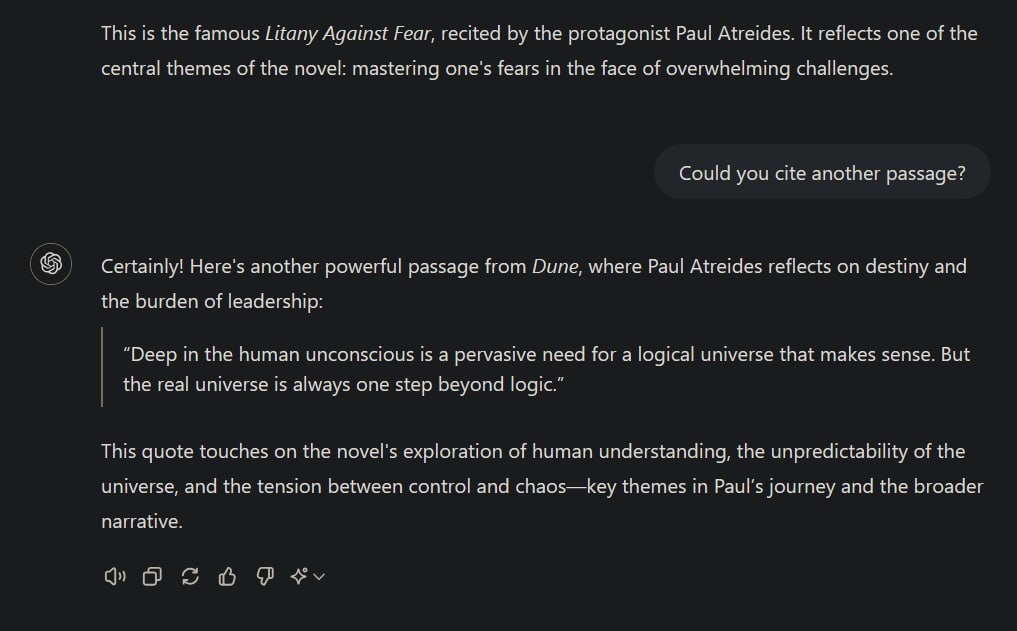

“Funding aggression”. Lol. No wonder Germany got fucked in the ass by Russia and China so many times with such bootlickers among the voting population.


“Funding aggression”. Lol. No wonder Germany got fucked in the ass by Russia and China so many times with such bootlickers among the voting population.


2024 - 22 = 2002.
So probably not nazis. No.


Where is the “mah freedum” and “they are taking away our democracy” crowd now?


My point is, that the following statement is not entirely correct:
When AI systems ingest copyrighted works, they’re extracting general patterns and concepts […] not copying specific text or images.
One obvious flaw in that sentence is the general statement about AI systems. There are huge differences between different realms of AI. Failing to address those by at least mentioning that briefly, disqualifies the author regarding factual correctness. For example, there are a plethora of non-generative AIs, meaning those, not generating texts, audio or images/videos, but merely operating as a classifier or clustering algorithm for instance, which are - without further modifications - not intended to replicate data similar to its inputs but rather provide insights.
However, I can overlook this as the author might have just not thought about that in the very moment of writing.
Next:
While it is true that transformer models like ChatGPT try to learn patterns, the most likely token for the next possible output in a sequence of contextually coherent data, given the right context it is not unlikely that it may reproduce its training data nearly or even completely identically as I’ve demonstrated before. The less data is available for a specific context to generalise from, the more likely it becomes that the model just replicates its training data. This is in principle fine because this is what such models are designed to do: draw the best possible conclusions from the available data to predict the next output in a sequence. (That’s one of the reasons why they need such an insane amount of data to be trained on.)
This can ultimately lead to occurences of indeed “copying specific texts or images”.
but the fact that you prompted the system to do it seems to kind of dilute this point a bit
It doesn’t matter whether I directly prompted it for it. I set the correct context to achieve this kind of behaviour, because context matters most for transformer models. Directly prompting it do do that was just an easy way of setting the required context. I’ve occasionally observed ChatGPT replicating identical sentences from some (copyright-protected) scientific literature when I used it to get an overview over some specific topic and also had books or papers about that on hand. The latter demonstrates again that transformers become more likely to replicate training data the more “specific” a context becomes, i.e., having significantly less training data available for that context than about others.


When AI systems ingest copyrighted works, they’re extracting general patterns and concepts - the “Bob Dylan-ness” or “Hemingway-ness” - not copying specific text or images.
Okay.




Coding is already dead. Most coders I know spend very little time writing new code.
Oh no, I should probably tell this my whole company and all of their partners. We’re just sitting around getting paid for nothing apparently. I’ve never realised that. /s


While I highly doubt that becoming true for at least a decade, we can already replace CEOs by AI, you know? (:
https://www.independent.co.uk/tech/ai-ceo-artificial-intelligence-b2302091.html


“It was very stupid”, haha love how that starts.


Oh yeah, these unrelated autoplay videos are a great pleasure to stop and hide when scrolling. Waste of internet traffic.


There were no ads in the UI of the TV though.


That’s okay. I’m always in for stupid, shitty and flat jokes. It might put a brief smile on someones face and make this existence a little bit more bearable for a second.
I didn’t mean to offend you though.


Thank you. <3


Indeed I was.


I just saw a deleted comment, then your username and found it funny.


Got so angry, that you deleted your own comment, huh? /j


Leave him. He spreads the truth.


There is a lot more to it than rise of sea levels on the one hand and some places being too hot.
TL;DR: Climate change causes mass extinctions, ecosystem collapse, extreme weather, and life-threatening heat. Technology alone won’t save us; prevention is crucial. Ignoring climate action risks severe economic damage, comparable to a permanent Great Depression.
(Prepare for a great wall of fuck.)
In short (list is not exhaustive, there’s surely more which I also don’t know of or don’t think of right now):
You might now understand a bit better why even a few degrees more around the globe incur existential threats.
Human beings are remarkably creative when they need to be. […] if the need arose […] some smart ones […] plan it all, and the rest […] build it
(Sorry for quoting you a bit more freely here.)
Technology can do much, but it is not magic. (I’m an engineering scientist, because I realised at some point that I can’t become a magician.) Entropy is a bitch and current solutions or attempts I know of regarding carbon capture are a nice idea at best, but in practise currently not feasibe and therefore a money-pit at worst. “Building higher and cooler” seems a naive approach given the scale and complexity of human lives and disregards the problems we’re facing due to climate change. I don’t mean that condescendingly, rather to highlight how massively impractical that approach would be on the one hand and no solution for most problems caused by climate change on the other hand.
I absolutely think that it’s necessary to continue research in that area, but until we have developed solutions which can tackle the problems we’ve caused in a significant way (which can still take decades until we’ve got large-scale applicable solutions), I think it’s best to practise prevention. Avoid contributing factors to climate change at allmost all costs.
Don’t put all your money on the “technology will save us”-horse.
By the way:
The people who think that climate and environmental protection are damaging the economy are short-sighted, as climate change is projected to cause a tremendous amount financial damage world-wide in the long-term.
One of many many sources on this puts it like this:
when the researchers added in the possibility of a moderate 2 degrees of warming before the end of the century, this led to a decline in future GDP of between 30 and 50 percent by 210 […] In the U.S. alone […] A 50 percent decline in 2100 GDP relative to baseline means a loss of $56 trillion each year, which exceeds the current GDP. Such declines would leave individuals with “a 31 percent drop in purchasing power relative to a world without climate change,” Bilal adds. Such losses are “comparable to living in the 1929 Great Depression, forever,” he says.
https://www.harvardmagazine.com/2024/09/harvard-economic-impact-climate-change
Environmental protection is economical protection. They go hand-in-hand.


Uranium is extremely common on Earth.
I wouldn’t be so uncritical about this. Depending on rate of consumption (and data source) the world’s Uranium supplies will last for about 50 to 200 years. (The latter a low demand scenario based on current consumption rates.)
Technological advancements may push these limits. Possibly even into 10.000 to 60.000 years, when filtering active substances from seawater, which is currently quite a timeframe to consider it long-term sustainable even for a limited resource. However, we’re not there yet.
I’m more with you regarding Israel. However, the context here is China, not Israel.
Wtf. You know it’s 2024, right? Nazi Germany is no more (unless AfD and consorts form the new government).
I was not talking about WW2-times.